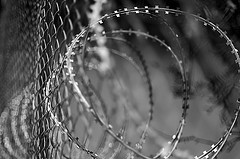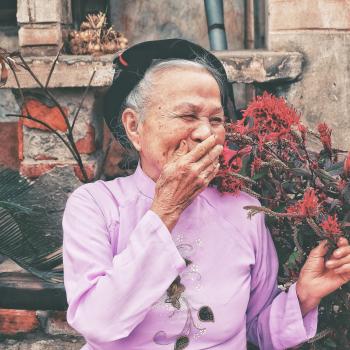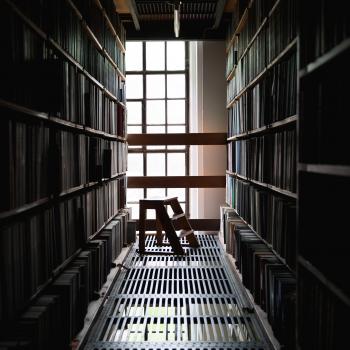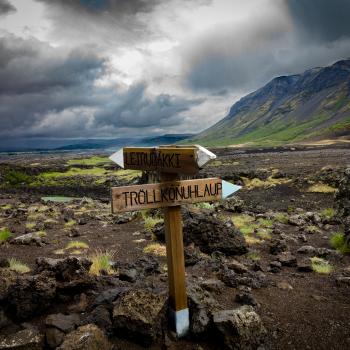Continued from yesterday.
 Thinking of the psalms as a way to cycle through the entire range of human experience, I recently brought them with me into juvenile detention.
Thinking of the psalms as a way to cycle through the entire range of human experience, I recently brought them with me into juvenile detention.
The kids there, on Sunday afternoons, shuffle through automated doors wearing orange jumpsuits and pink booties and take their seats shyly around bolted-down steel tables with me.
These are boys and girls who have likely seen, and felt on their bodies, and heard, what no child should have to see or feel or hear. And after absorbing all they’ve endured and trying to maintain composure, they have probably been kicked out of classrooms for not watching their tongues. For small outbursts, foul language, bad attitudes. Now, in detention, they spend most of their time in lockdown, in cells of their own, alone.
I look around the circle. A white girl’s hair is half dyed pink. A Mexican boy’s still-cheek has a fresh gang tattoo shining just under his eye. Six other kids sit slumped on their steel stools, quiet, guarded, used to being corrected.
The psalm I’ve always most hated is now the psalm with which I begin. Its nastiness is now good news to me.
We read Psalm 137, where the crushed psalmist was recently taken into captivity, his people’s families taken from them, most likely having witnessed rape and murder, and now they are slaves, nobodies. The psalm, the prayer, warms up asking how the hell they can sing to God when sitting in Babylon, in the system they hate? The final lines cease to address God entirely and delight in the fantasy of their captors’ babies being tossed against rocks.
And—what always surprises those in jail studies—no “amen.”
Kids look up from their Bibles after we finished reading it, all with big eyes.
I tell the youth, “This is in the Bible. Singing to God about killing babies. The very things that might get you arrested, kicked out of school or your job or your marriage.”
I ask them, “What is in you? What’s your psalm?” I know they’ll be back in their lonely cells for the rest of the day. “Use your time in your cell. Let it all out. You’re not going to offend God.”
My then juvenile chaplaincy partner, an ex-gang-member and talented rap artist, recited one of his early laments about losing his son to child protective services as a teenager, before he knew he was talking to God. He closed his eyes and danced one tattooed forearm with long fingers through the air as he laid out his lines.
We then gave the kids paper and ten minutes to try writing their own psalms.
When the boys and girls had to line up in their orange jumpsuits and pink booties, the tallest, toughest-looking guy discreetly handed me his folded, yellow piece of paper. “I know it’s to God,” he whispered, “but will you hold onto this for me?”
In my car, parked out behind the detention facility, I opened this fresh psalm (unedited by me, save for added line breaks) and read it while the rain pattered against the windows all around me:
I fill so help less
Im to the point of giveing up on trying to have hope
im tired of filling sorry for my self
I hate my self
I truly want to be out of my missery
i am a feillur to my kids
to my whife
Im in tourcher that say’s
Im the one who causes the most pain
An im lonly
is a filling iv felt for far too long
If you rilly out thir god pleas take my pain
save me from being lony
Be my way to freedome
lord i wana die
“As long as we ourselves are real,” writes an Russian Orthodox Archbishop, Anthony Bloom, “as long as we are truly ourselves, God can be present and can do something with us.” Bloom was a French resistance fighter and an army surgeon before he became a priest and wrote the book Beginning To Pray. “But the moment we try to be what we are not, there is nothing left to say or have; we become a fictitious personality, an unreal presence, and this unreal presence cannot be approached by God.”
So the psalms are indeed human, all too human. Such prayers are not sermons, not good doctrine to refine and teach. They are not fair portraits of God—but of us, and how we can be in true relationship. They are the mess of our shared condition, in all its forms, being welcomed into God. Wielded in this way, I now wonder if the psalms are still what we most need, to unlock our hearts, a freedom worth cycling through the cells of lockdown America.
I don’t know where the boy who wrote the psalm is today—in the endless criminal justice system wearing khakis, or out of custody and asleep on a couch somewhere in some cigarette-smoke-filled apartment, or racing a car without a license down back roads late at night with trouble under the seat, or holding his child and reading her a bedtime story. But I have his folded psalm still with me, raw and pure. And I like to think that his lips move more freely, wherever he is, that his tears come as easily, and that he feels heard.
Chris Hoke works with Tierra Nueva in Washington State’s Skagit Valley. His first book, WANTED: A Spiritual Pursuit Through Jail, Among Outlaws, and Across Borders came out from HarperOne in February 2015. Learn more at chris-hoke.com.
Photo above credited to kewlscrn and used under a Creative Commons license.











